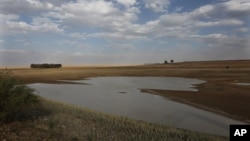Last year was the hottest year on record. This is partly due to an exceptionally strong El Niño, and partly because of global warming resulting from human activity. El Niño departed in early June, but the heat continues, and the resulting drought has left nearly 100 million people around the globe facing a bleak and hungry future.
Some of the hardest-hit regions are in southern Africa. Around 18 million people there are expected to suffer crisis food insecurity, meaning a crisis has resulted in hunger and diminished nutrition. This and other impacts on livestock, water access, and treatment for those living with HIV will last well into 2017.
“This drought is having a devastating impact on the southern Africa region, and we know things could get even worse,” said Rebecca Sutton of Oxfam, an international confederation of charitable organizations that work toward ending global poverty. “People are struggling now. They have watched their crops wither and their animals starve to death. Even in the best-case scenario the next major harvest is not expected until early next year.”
The Southern African Development Community has launched an emergency appeal for $2.4 billion to help those most severely hit by the drought, and protect development gains. The Regional Inter-agency Standing Committee has released an action plan targeted at the seven most-affected countries: Angola, Lesotho, Madagascar, Malawi, Mozambique, Swaziland and Zimbabwe, which requires $1.2 billion in funding.
In response, the United States announced an additional $127 million to this effort, bringing the total the United States has provided to the region to over $300 million in humanitarian aid. This includes emergency food assistance, nutrition and health support, access to safe drinking water, and seeds. The funding will be delivered through the United Nations and our NGO partners.
Based on early warning and careful tracking of the progression of El Niño, the United States mobilized an integrated response earlier this year to ensure El Nino’s impacts do not negate the progress we've already made in reducing hunger and poverty. We have also adjusted development investments to lessen the drought's impacts, speed recovery, and to help build resilience in southern Africa.
The United States applauds the many fellow donors who have contributed to the southern Africa drought response, and encourages others to join this international effort. Mobilizing a robust and coordinated global response will be critical to protect the region's gains against chronic hunger and poverty, and to ensure early recovery.














